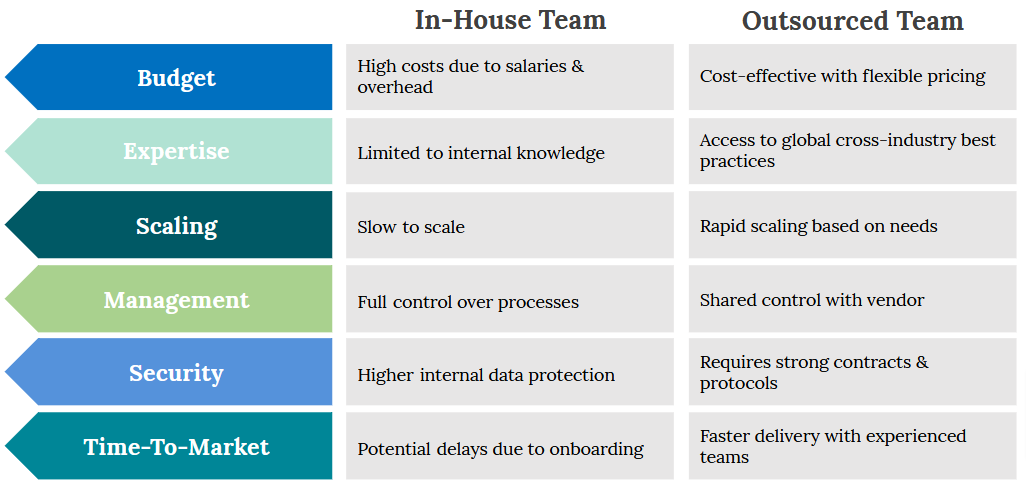In-house DevOps or Outsourcing: Making the Smart Choice




Today businesses are constantly seeking ways to streamline processes, reduce costs, and deliver high-quality products faster. DevOps, a methodology that bridges the gap between development and operations, has become a cornerstone of modern IT strategies. However, one critical decision remains: should you build an in-house DevOps team or outsource these services? Both options come with unique advantages and challenges, making this a pivotal choice for any organization.
DevOps integrates software development and IT operations to improve collaboration, automate workflows, and accelerate the software delivery lifecycle. It encompasses practices like continuous integration/continuous delivery (CI/CD), infrastructure as code (IaC), and automated testing. The ultimate goal is to enhance efficiency, reliability, and scalability while reducing time-to-market. Whether you choose an in-house team or outsourcing partner, the core DevOps processes—such as source code control, build automation, release management, and deployment—remain the same. The real difference lies in how these processes are executed and managed. Both options have their merits and challenges, and the right choice depends on your organization’s unique needs, goals, and resources. Let’s dive into the pros and cons of each approach to help you make an informed decision, understand trade-offs, emerging trends, and strategies to align with your business goals.
Building an in-house DevOps team means hiring full-time employees who work exclusively for your organization. This approach offers several benefits and challenges:
Advantages:
Deep Product Knowledge: An in-house team gains intimate knowledge of your systems, culture, and long-term goals. This familiarity fosters better alignment with your business objectives.
Enhanced Security: Sensitive data stays within your organization, reducing the risk of information leaks.
Complete Control: You have direct oversight of your team’s activities, ensuring accountability and quality.
Long-Term Knowledge Retention: Institutional expertise grows over time, reducing dependency on external vendors.
Challenges:
High Costs: Salaries, benefits, training, office space, and equipment make in-house teams a costly investment. This is especially true for small to medium-sized enterprises.
Recruitment Difficulties: Finding skilled DevOps professionals can be challenging due to high demand and limited talent pools in certain regions.
Scalability Issues: Expanding or downsizing an in-house team takes time and resources, making it less flexible for fluctuating project needs.
Time Investment: Building a competent team requires significant time for hiring, onboarding, and training.
Limited Expertise: Even with a skilled team, there may be knowledge gaps that require external expertise, adding to costs.
In-house teams are ideal for large enterprises with extensive IT budgets or companies that prioritize extra level security and long-term collaboration over cost savings.
Outsourcing DevOps involves partnering with external providers who specialize in delivering these services. This model has gained significant traction due to its flexibility and cost-effectiveness.
Advantages:
Cost Efficiency: Outsourcing eliminates overhead costs like recruitment, training, and infrastructure. You pay only for the services you need.
Access to Expertise: Outsourced teams bring diverse experience from multiple projects across industries. They are well-versed in best practices and cutting-edge tools.
Scalability: External providers can quickly adjust team size based on project demands, ensuring agility.
Faster Time-to-Market: With specialized teams focusing on your project around the clock, you can accelerate development cycles.
Cutting-Edge Tools: Outsourcing firms leverage AI-driven pipelines, automated testing, and multi-cloud strategies pre-optimized for scalability
Focus on Core Business: Offload your DevOps tasks and let your internal team focus on core business initiatives.
Challenges:
Security Risks: Sharing sensitive data with third-party providers requires careful contract negotiation and robust security measures.
Limited Control: While outsourcing offers expertise, you may have less direct oversight compared to an in-house team.
Dependency on Vendors: Poor communication or misaligned goals with your outsourcing partner can impact project outcomes.
Communication Challenges: Time zone differences or language barriers can sometimes hinder seamless collaboration between internal stakeholders and outsourced teams.
Outsourcing is particularly beneficial for startups or growing businesses that need quick access to skilled professionals without long-term commitments.
The decision between an in-house team and outsourcing depends on various factors:

The decision to build an in-house team or outsource your DevOps depends on your specific needs, budget, and long-term goals.
Consider outsourcing if:
Consider building an in-house team if:
DaaS offers a hybrid approach that combines the benefits of in-house expertise with the flexibility and cost efficiency of the classical outsourcing model. By partnering with DevOps as a Service provider, you gain access to a team of experts who can handle everything from cloud migration to continuous integration and deployment. This model allows you to:
Effectively use DaaS at any organization: DevOps as a Service model fits perfectly to organizations of any type and size.
Optimize Costs: Pay only for the services you need, reducing overhead costs associated with maintaining an in-house team.
Enhance Scalability: Scale your DevOps capabilities up or down as needed, ensuring you can respond quickly to changing business demands.
Access Global Expertise: Tap into a global talent pool, ensuring your projects benefit from the latest DevOps practices and technologies.
Ability to combine in-house and outsourced teams: Manage DevOps tasks easily and redistribute them between in-house and outsourced teams any time you need.
This approach allows you to balance cost-efficiency with control while leveraging external expertise when needed.
If you decide to partner with a DaaS provider, keep these tips in mind:
Define Clear Goals: Clearly outline your objectives and expectations.
Choose the Right Partner: Select a provider with a proven track record, relevant expertise, and a strong security posture.
Start Small: Begin with a pilot project to test the waters and build trust.
Monitor Performance: Track key metrics to ensure the partnership is delivering the desired results.
Choosing between an in-house DevOps team or outsourcing is not a one-size-fits-all decision—it requires careful consideration of your organization’s unique needs and goals. While an in-house team offers long-term collaboration and control, outsourcing provides cost-effective access to expertise and scalability. At Svit Software, we specialize in providing tailored DevOps as a Service solution that aligns with your business objectives—whether you’re looking for full-scale outsourcing or hybrid support models. By leveraging DevOps as a Service, you can enjoy the benefits of specialized expertise, cost efficiency, and scalability while maintaining control over critical aspects of your operations. Let us help you unlock the full potential of DevOps in your company to drive innovation and growth! Ready to take the next step? Contact us today for a free consultation!
We specialize in DevOps as a Service, combining industry-leading best practices with tailored solutions to optimize workflows, enhance scalability, and ensure seamless infrastructure performance. We are here to transform your DevOps processes into a strategic advantage. Whether you’re scaling operations or refining deployment pipelines, our team will deliver the technical expertise and proactive support you need.

Learn how our experts can accelerate your business growth with DevOps as a Service offering